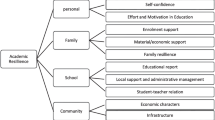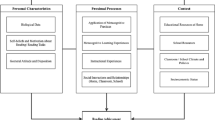Abstract
Reading literacy is the main focus of the international comparative study of PISA 2009 (OECD, PISA 2009 results: What students know and can do: Student performance in reading, mathematics and science, 2010a) based on the results of which 65 economies were arranged in a league table. PISA also gathers background information which implicitly helps understand the achievement or the lack of it. The present study analyzes data of selected variables for four East Asian economies (Shanghai, Hong Kong, Korea, and Singapore) which appear at the top of the league table, paying special attention to the ESCS (Economic, Social, and Cultural Status) disadvantaged students who are resilient in spite of being in an unfavorable condition. Logistic regression was run on the data to identify the predictive variables. Family structure, expected education, kindergarten attendance, and three reading engagement measures were found to differentiate between the ESCS disadvantaged and non-disadvantaged students. To help raise the reading literacy standard of the disadvantaged non-resilient students relative to the resilient students, attention needs be paid especially to enjoyment of reading activities and awareness of metacognitive reading strategies, which are alterable variables at the disposal of the stakeholders.

Similar content being viewed by others
References
Benard, B. (1993). Fostering resiliency in kids. Educational Leadership, 51, 44–48.
Broekman, B. F. P., Woo, B. S. C., Chan, Y. H., Fung, D., & Ng, T. P. (2011). Risks and protective factors associated with mental well-being and academic performance in primary school aged children in Asia. UvA-DARE, The Institutional Repository of the University of Amsterdam.
Brozo, W. G., Shiel, G., & Topping, K. (2007). Engagement in reading: Lessons learned from three PISA countries. Journal of Adolescent and Adult Literacy, 51(4), 304–315.
Bruce, M. A. (1995). Fostering resiliency in students: Positive action strategies for classroom teachers. The Teacher Educator, 31, 178–188.
Byun, S., & Park, H. (2012). The academic success of East Asian American youth: The role of shadow education. Sociology of Education, 85(1), 40–60.
Cappella, E., & Weinstein, R. S. (2001). Turning around reading achievement: Predictors of high school students’ academic resilience. Journal of Educational Psychology, 93(4), 758–771.
Dawson, W. (2010). Private tutoring and mass schooling in East Asia: Reflections of inequality in Japan, South Korea, and Cambodia. Asia Pacific Education Review, 11, 14–24. doi:10.1007/s12564-009-9058-4.
Department of Education, Taipei City Government (2012). A study tour report to visit Shanghai by the Year 100 Secondary Chinese Language Counseling Group. Retrieved April 22, 2013, from http://www.openreport.taipei.gov.tw/OpenFront/report/report_detail.jsp?sysId=C100AW364.
Guthrie, J. T., & Wigfield, A. (2000). Engagement and motivation in reading. In M. L. Kamil, P. B. Mobenthal, P. D. Pearson, & R. Barr (Eds.), Handbook of Reading Research (Vol. 3, pp. 403–420). New York: Longman.
Henderson, N., & Milstein, M. (1996). Resiliency in schools. Thousand Oaks, CA: Corwin.
Hofstede, G. (1980). Cultural consequences: International differences in work-related values. Beverly Hills, CA: Sage.
Kim, S., & Lee, J. H. (2010). Private tutoring and demand for education in South Korea. Economic Development and Cultural Change, 58(2), 259–296. doi:10.1086/648186.
Kim, T. H., Lee, S. M., Yu, K., Lee, S., & Puig, A. (2005). Hope and the meaning of life as influences on Korean adolescents’ resilience: Implications for counselors. Asia Pacific Education Review, 6(2), 143–152.
Krovetz, M. L. (1999). Fostering resiliency: Expecting all students to use their minds and hearts well. Thousand Oaks, CA: Corwin.
Kwang, S. P., & Tang, S. (2011). Singapore youth resilience survey: Examining the stressors, risks and resilience of young people. Singapore: Beyond Social Services.
Lau, K. L. (2009). The reading performance of Hong Kong secondary students in the Program for International Student Assessment: Insights for the Chinese language curriculum reform. Journal of Research in Education Sciences, 54(2), 85–105.
Lau, K. L. (2011). Reflection on the results of the Program for International Student Assessment (PISA): Chinese language curriculum, teaching, and Hong Kong students’ reading literacy. Curriculum and Instruction Quarterly, 14(2), 49–72.
Lau, K. L., & Chan, D. W. (2003). Reading strategy use and motivation among Chinese good and poor readers in Hong Kong. Journal of Research in Reading, 26(2), 177–190.
Lee, C. J., Kim, Y., & Byun, S. (2012). The rise of Korean education from the ashes of the Korean War. Prospects: Quarterly Review of Comparative Education, 42(3), 303–318. doi:10.1007/s11125-012-9239-5.
Luyten, H., Peschar, J., & Coe, R. (2008). Effects of schooling on reading performance, reading engagement, and reading activities of 15-year-old in England. American Educational Research Journal, 45(2), 319–342.
Mak, S. K. (2013). Explanation of gender differences in reading literacy performance for 15-year-old students in Macao: Mediating effects of reading engagement. Unpublished PhD dissertation, University of Macau.
Masten, A. S., Best, K. M., & Garmezy, N. (1990). Resilience and development: Contributions from the study of children who overcome adversity. Development and Psychopathology, 2, 425–444.
Ministry of Education, Singapore (2009). Reading abilities of primary one students. Parliamentary replies. Retrieved April 22, 2013, from http://www.moe.gov.sg/media/parliamentary-replies/2009/03/reading-abilities-of-primary-o.php.
OECD. (2005). PISA 2003 data analysis manual: SPSS users. Paris: OECD.
OECD. (2010a). PISA 2009 results: What students know and can do: Student performance in reading, mathematics and science (Volume I). Paris: OECD Publishing.
OECD. (2010b). PISA in Focus: How do some students overcome their socio-economic background?. Paris: OECD Publishing.
OECD. (2010c). PISA 2009 results: Overcoming social background: Equity in learning opportunities and outcomes (Volume II). Paris: OECD Publishing.
OECD. (2010d). PISA 2009 results: Learning to learn: Student engagement, Strategies and practices (Volume III). Paris: OECD Publishing.
OECD. (2010e). Strong performers and successful reformers in education: Lesson from PISA for the United States. Paris: OECD Publishing.
OECD. (2011). Against the odds: Disadvantaged students who succeed in school. Paris: OECD Publishing.
OECD & Pearson Foundation (2013). Education policy experience videos: Strong performers and successful reformers in education: Korea. Retrieved April 22, 2013, from http://www.pearsonfoundation.org/oecd/korea.html.
Shek, D. T. L. (2002). The relation of parental qualities to psychological well-being, school adjustment, and problem behavior in Chinese adolescents with economic disadvantage. The American Journal of Family Therapy, 30(3), 215–230.
Shek, D. T. L. (2004). Chinese cultural beliefs about adversity: Its relationship to psychological well-being, school adjustment and problem behavior in Hong Kong adolescents with and without economic disadvantage. Childhood: A Global Journal of Child Research, 11(1), 63–80.
Shen, X. (2012). Shanghai resilient students’ learning characteristics: Evidence-based research with PISA 2009 data. Exploring Education Development, 18, 25–36.
Soh, K. C. (2012). Fifteen-years-old students of seven East Asian cities in PISA 2009: A secondary analysis. New Horizons in Education, 60(1), 83–91.
Soh, K. (2013). Finland and Singapore in PISA 2009: Similarities and differences in achievement and school management. Compare: A Journal of Comparative and International Education. http://dx.doi.org/10.1080/03057925.2013.787286.
Wang, T., Lu, J., Li, B., & Zheng, Z. (2011). Searching for the reasons of Shanghai students’ high scores in PISA 2009 reading assessment with a school system perspective. Curriculum and Instruction Quarterly, 14(4), 93–116.
Waxman, H. C., Gray, J. P., & Padron, Y. N. (2003). Review of research on educational resilience. UC Berkeley: Center for Research on Education, Diversity and Excellence.
WESTAT. (2007). WesVar ® 4.3 User’s guide. Rockville: WESTAT.
Author information
Authors and Affiliations
Corresponding author
Rights and permissions
About this article
Cite this article
Cheung, Kc., Sit, Ps., Soh, Kc. et al. Predicting Academic Resilience with Reading Engagement and Demographic Variables: Comparing Shanghai, Hong Kong, Korea, and Singapore from the PISA Perspective. Asia-Pacific Edu Res 23, 895–909 (2014). https://doi.org/10.1007/s40299-013-0143-4
Published:
Issue Date:
DOI: https://doi.org/10.1007/s40299-013-0143-4




